Electric cars have emerged as a promising solution to the environmental and sustainability challenges posed by traditional fossil fuel-powered vehicles. With an increasing focus on reducing carbon emissions and improving air quality, electric cars have gained traction for their eco-friendly operation. Beyond their environmental benefits, electric cars come equipped with advanced safety features designed to enhance both driver and passenger safety.
This exploration delves into the safety features integrated into electric cars, shedding light on how these advancements contribute to a safer and more sustainable future of transportation.
Airbags & ABS
Airbags are one of the most important safety features of any car, and electric cars are no exception. Airbags provide cushioning and protection in the event of a collision, reducing the likelihood of serious injuries. Most electric cars come with a full suite of airbags, including driver- and passenger-side airbags, side airbags, and even knee airbags. This level of protection helps ensure that everyone in the car is safe in the event of a crash. ABS, or Anti-lock Braking System, is another important safety feature of electric cars. This system uses sensors to monitor the wheels and detect if they’re about to lock up.
If the wheels are about to lock, the ABS will automatically apply brakes to prevent the car from skidding. This helps drivers maintain control of the car and avoid dangerous situations. Other important safety features of electric cars include traction control, hill start assist, and electronic stability control. Traction control helps maintain grip when driving on slippery surfaces. Hill start assist helps prevent the car from rolling backward when taking off from a stop on an incline. Electronic stability control helps maintain control of the car during unexpected maneuvers, such as if you have to swerve to avoid a collision.
Benefits & Safety
Electric cars can provide a number of safety benefits compared to traditional gas-powered vehicles. One of the key safety features of an electric car is the low center of gravity, which helps to reduce the risk of rollover accidents. Additionally, electric cars are quieter than traditional cars, which can allow drivers to detect nearby hazards better and respond more quickly.
Furthermore, electric cars often come equipped with advanced driver assistance systems such as lane departure warning and collision avoidance systems that can help drivers to stay safe on the road. Finally, electric cars tend to have fewer moving parts than traditional cars, which can reduce the chance of mechanical failure that could lead to an accident.

Emergency Braking Systems
This system uses sensors to detect potential obstacles ahead and will automatically apply the brakes to help the driver slow down or stop the vehicle. This can be especially helpful in unexpected situations, such as when a pedestrian or animal suddenly appears in front of the car. Another important safety feature is the traction control system.
This system helps the car maintain stability while cornering or accelerating, particularly on slippery surfaces. The system uses sensors to monitor the speed of the wheels and can reduce power to the wheels if it detects too much slip. This helps the driver maintain control of the vehicle, even during low-traction driving conditions.
In addition, electric cars are designed to minimize the risk of rollover accidents. The low center of gravity of electric cars, combined with the weight of the battery, helps keep the vehicle stable. This reduces the risk of rollover accidents, which can be particularly dangerous in traditional vehicles.

Overall, electric cars come with a range of safety features that make them a great choice for drivers who are concerned about their safety on the road. With these features, electric cars can help keep drivers, passengers, and pedestrians safe.
Safety Features
Electric cars are becoming more and more popular, and with their rise in popularity comes an increase in safety. With the latest electric car models, drivers can enjoy a range of innovative safety features that can help keep them safe on the road. From automatic emergency braking systems to advanced lane-keeping technology, electric cars are packed with some of the best safety features available today.
These systems can provide drivers with extra peace of mind, helping them to avoid dangerous situations and protect themselves from harm. With these safety features, electric cars are a great way to get around and stay safe.
Benefits & Stats
Electric cars are becoming increasingly popular for their environmental benefits, but they also come with a variety of safety features that make them a smart choice for any driver. From airbags to brakes, electric cars offer a variety of features to protect their passengers. Many electric cars are equipped with advanced safety technologies such as automatic emergency braking, lane departure warning systems, and adaptive cruise control, which can help reduce the risk of accidents.
Additionally, electric cars come with a variety of airbags that are designed to protect passengers in the event of a crash. In addition to airbags, many electric cars have reinforced frames, which can help protect passengers from the impact of a crash. Finally, electric cars are also equipped with advanced braking systems that help drivers maintain control of their vehicles in any situation.
Collision Avoidance Systems
Collision avoidance systems are becoming increasingly important for drivers of electric cars. As electric cars become more popular, there is a growing need for additional safety features to ensure drivers and passengers are protected. Collision avoidance systems are designed to reduce the risk of collisions by providing drivers with warnings and assistance when a hazard is detected.
Collision avoidance systems can be divided into two main categories: active and passive. Active systems are designed to provide warnings to the driver when a potential collision is detected. These systems can detect obstacles in the car’s path and alert the driver to take evasive action.
Active systems can also be programmed to slow the car or even stop the car if needed. Passive systems, on the other hand, are designed to help the driver avoid collisions by providing feedback on the car’s speed and distance from other objects. This feedback can help the driver make decisions that will reduce the risk of a collision. Some passive systems can also assist, such as automatically steering the car away from an obstacle.
In addition to active and passive systems, electric cars may also feature a variety of other safety features. For example, some cars have sensors that detect when an object is in the driver’s blind spot and alert the driver to take action.
Safety Features
Electric cars are becoming increasingly popular as an environmentally friendly alternative to fuel-powered vehicles. With this surge in popularity, it is important to consider the safety features of electric cars. Modern electric cars are equipped with a range of safety features that provide peace of mind and help keep drivers safe.
These features include advanced airbags, reinforced chassis, seat belt pre-tensioners, anti-lock brakes, and electronic stability control. Additionally, some electric cars come with features such as adaptive cruise control, which helps drivers maintain a safe distance from other vehicles on the road. All of these features work together to provide a safe driving experience for drivers of electric vehicles.
Frequently Asked Questions
What are the safety features of an electric car?
Electric cars are equipped with many safety features, such as airbags, seatbelts, antilock brakes, stability control, and blind spot monitoring. Additionally, electric cars are designed to reduce the risk of rollover accidents.
Are electric cars safer than conventional cars?
Yes, electric cars generally have better safety ratings than conventional cars due to their enhanced safety features.
What are the benefits of an electric car?
Electric cars offer a variety of benefits, such as lower emissions, lower fuel costs, and reduced maintenance costs. Additionally, electric cars are typically quieter and smoother to drive than conventional cars.
What are the environmental benefits of electric cars?
Electric cars produce fewer emissions than conventional cars, which helps to reduce air pollution and global warming. Additionally, electric cars are powered by renewable energy sources such as solar or wind power, which further reduces their environmental impact.
Are electric cars more efficient than conventional cars?
Yes, electric cars are more efficient than conventional cars due to their ability to convert energy more efficiently. Additionally, electric cars typically have fewer moving parts, which helps to reduce wear and tear over time.
How reliable are electric cars?
Electric cars are typically very reliable, as most electric cars come with long warranties that cover most components. Additionally, electric cars require less maintenance than conventional cars, which helps to reduce the cost of ownership over time.
Conclusion
Electric cars are the way of the future, and safety is a key factor to consider when deciding which car to purchase. Electric cars are equipped with a variety of safety features, such as regenerative braking, advanced traction control, and airbags, which provide drivers with the peace of mind that their car is safe and secure. With the increased presence of electric cars on the road and the ever-evolving technology, electric vehicle owners can be confident that their car is as safe or safer than a traditional gasoline-powered vehicle.

I am James Beaupre, the founder of batteryvehicleprice.com. With a deep-rooted passion for vehicle batteries, I have dedicated my career to exploring and understanding the intricacies of this crucial technology. My website aims to provide valuable insights and information on battery-powered vehicles, empowering individuals to make informed decisions.
